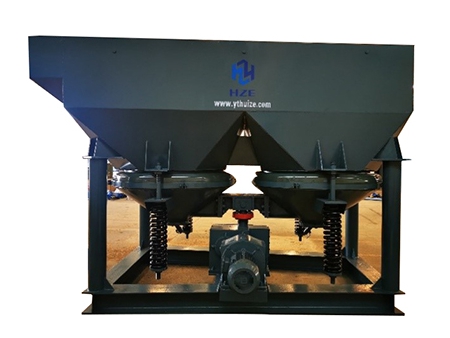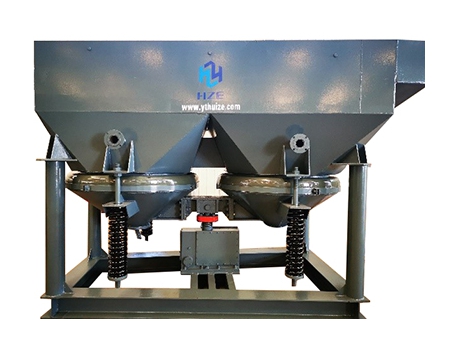Jig concentrator
Jig concentrators are one of the most common gravity separation equipments today. Thanks to its large processing capacity, application in a wide range of particle sizes and easy operation and maintenance, the concentration machine is widely adopted to concentrate or further concentrate useful minerals from river gold, tin, titanium, hematite, magnetite and coal, especially common in processing manganese ores and barite.
The latest jig concentrators can better help particle stratification based on weight difference without little impact on the classification ratio and recovery rate, compared with the conventional jig concentrators. The traditional separation machine is usually driven by circular eccentric force and creates jigging curves of sinusoidal waveform in most cases. More importantly, the traditional concentrator is bad in particle stratification as the speed and function time of rising and falling water currents resulting from the diaphragm motion are almost the same.
- The jig concentrator has a strong separation capability and high recycling rate, as the diaphragm movement compels the rising water currents to run faster than the falling ones and maximize the deposition of heavy minerals. The gravity concentrating device increases the recycling rate of tin by 3.01%, tungsten 5.5%, lead1.63% and zinc 2.04%.
- Compared with the traditional version, the jig concentrator reduces the water consumption by 30%-40% and the land occupation by one third.
- The stroke is adjustable without limitation thanks to the adoption of electromagnetically adjusted motors.
As one the most common mineral processing equipments, jig concentrators are widely used in mineral processing, construction and chemical industries, and for acquiring silicate and other processed ores. In mineral processing, the jig concentrator is often used to separate ores, such as gold, silver, copper, lead, zinc, nickel, manganese, iron and molybdenum, and other materials like barite, quartz, graphite, feldspar and fluorite.
| Model | Jigging Chamber | Diaphragm | Feeding Size (mm) | Capacity (t/h) | Power (kW) | Weight (kg) | ||
| Shape | Area (m2) | Stroke (mm) | Frequency (Hz) | |||||
JT0.57-1 | Trapezoid | 0.57 | 8.5~12 | 1.3~3 | <6 | 1.5~3 | 1.5 | 640 |
JT1-1 | Trapezoid | 1.04 | 10~17 | <10 | 2.5~5 | 2.2 | 950 | |
JT2-2 | Trapezoid | 2.28 | 12~21 | <10 | 5~10 | 3 | 1690 | |
JT3-1 | Trapezoid | 3 | 12~30 | 0.83~2.1 | <10 | 7.5~15 | 5.5 | 3155 |
JT4-2 | Trapezoid | 4 | 25~57 | <25 | 8~20 | 7.5 | 3150 | |
JT4-2A | Trapezoid | 4 | 25~57 | <25 | 8~20 | 4×2 | 3550 | |
JT5-2 | Trapezoid | 4.86 | 12~30 | <10 | 12~25 | 7.5 | 4580 | |



